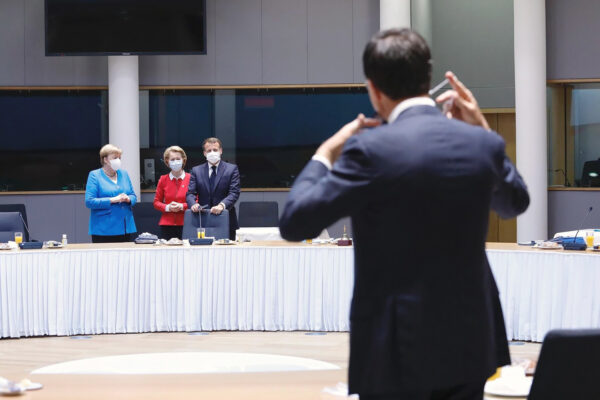
Dutch prime minister Mark Rutte has become the bête noire of EU integrationists for refusing to sign off on a €750 billion coronavirus recovery fund that largely consists of debt-financed grants.
Rutte is not alone. The leaders of Austria, Denmark, Finland and Sweden are also withholding support, which is why EU leaders are still holed up in Brussels after four days of talks.
But the Netherlands has the largest economy among this “frugal five” and Rutte doesn’t mind taking the heat.
Why?
Election
Stéphane Séjourné, who leads the French delegation in the liberal Renew Europe group — to which Rutte’s party belongs — argues the Dutchman is merely “flattering public opinion” at home. “The Netherlands has an election in eight months.”
The Financial Times has insinuated the same:
[Rutte’s] moralizing tone plays well with a public who have prospered from an open, liberal economy and seven decades of EU membership and wonder why Italians and Greeks cannot be more like them.
A look at the polls throws doubt on this argument. Rutte has never been more popular. Most Dutch voters believe he managed the outbreak of coronavirus well. His center-right party is faraway the largest in the polls. If he personally supported the recovery fund as proposed by the European Commission, France and Germany, he could spend the political capital he has on it.
Blocs
Rutte’s opposition isn’t coming out of nowhere. He previously led the resistance to Emmanuel Macron’s eurozone budget and a Franco-German push for protectionism after the European Commission had blocked the merger of the French and German train manufacturers Alstom and Siemens.
The Netherlands made common cause with the Baltic states, Denmark, Finland, Ireland and Sweden — dubbed the “New Hanseatic League” — to call for enforcing debt and deficit rules in the eurozone, completing the single market in services and pursuing international trade deals.
Germany, previously more on the side of the frugals, moved closer to France.
Brexit
This realignment is a consequence of Brexit. Angela Merkel concluded from the United Kingdom’s withdrawal that France and Germany need to lead to prevent a further weakening of the EU. Rutte decided that the Netherlands needs to assert its own interests.
In the past, the Dutch and other free-trading nations that prefer economic over political integration could count on the United Kingdom to block far-reaching proposals. Germany would play dealmaker between blocs.
Now the small, rich countries of Northern Europe need to fend for themselves.
Fund
Rutte and the other frugal four argue they are willing to show solidarity with Southern Europe, which has suffered the worst from the coronavirus pandemic. They have proposed a €700 billion recovery fund consisting of €350 billion in loans and €350 billion in non-repayable grants — up from zero grants in their initial proposal and down from €500 billion in the European Commission’s and Franco-German plans.
The grants would be financed by the European Commission issuing debts on behalf of EU member states.
The frugals worry this will introduce eurobonds and transfer union by the backdoor: the pooling of European debts and the subsidization of the South by the North, which they have always resisted. “Crisis measures” have a tendency to become permanent in the EU.
(The fund is separate from the EU’s regular, €1 trillion seven-year budget, although the two are being negotiated at the same time. France, Germany and the frugal five are net contributors to the budget. Spain and Central and Eastern European countries are net recipients.)
Solidarity
The Dutch tire of being told they’re not showing “solidarity” despite paying more into the EU budget per capita than any other nation. They helped pay for three bailouts of Greece, which majorities of Dutch voters opposed. Austria, Denmark, Finland, the Netherlands and Sweden are some of the highest-taxed nations in Europe. They ran surpluses in recent years and paid off their debts when France, Italy and Spain ran deficits and grew their debts. Italy even cut taxes. Yet those three countries are now not asking for “solidarity”, but demanding it — or else.
So the frugals insist on conditionality. As Rutte put it in an interview last weekend:
I don’t think it’s unreasonable to say, all right, we’re prepared to help, but then you really need to reform your pensions, really need to reform your labor market, so that next time you can take care of yourself. That’s how the South can show solidarity with the North.
Italy has for years ignored EU recommendations to liberalize its labor market, as a result of which the majority of Italians under the age of 30 are out of work and the majority of those in work lack social benefits.
Spain, which has one of the fastest-growing old-age populations in Europe, needs to figure out how to make its pension system affordable in the long term. Its current left-wing government reversed some of the labor reforms of the previous right-wing government, which had made it easier to fire workers.
It’s why so many talented young Italians and Spaniards relocate to Northern Europe.
